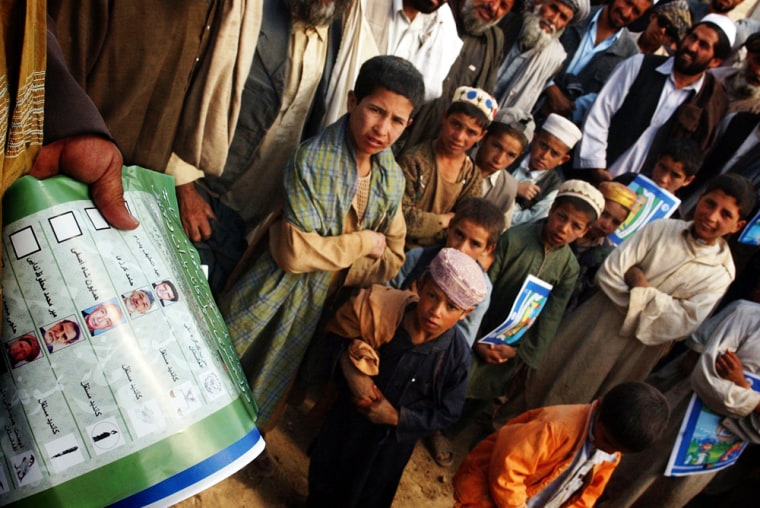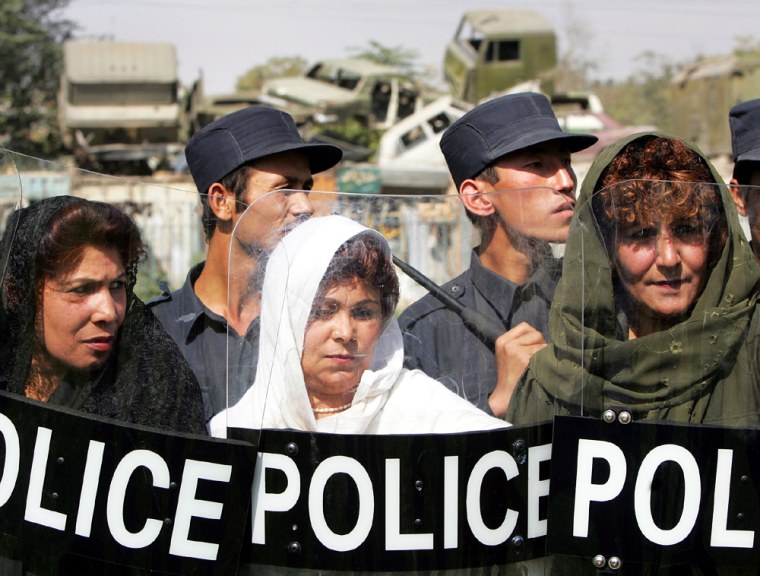Malik Ali Mahmad and his small security team were on high alert last Tuesday night. They had recently been sent to establish a government outpost in an isolated, Taliban-plagued district, Khaki Afghan, and there were rumors that the Islamic militia was planning a retaliatory raid.
"I heard they had issued orders to kill me," Mahmad said Friday. "At 11:30 p.m. they attacked. There were hundreds of them. They had heavy weapons and rockets and Kalashnikovs and grenades. The fight lasted 4 1/2 hours. I killed their commander, but I lost two of my sons and my best friend."
The beefy, turbaned man spoke tersely, his eyes red with grief but his voice brittle with contempt. He had returned to Qalat, the capital of the southeastern province of Zabol 50 miles to the south, to bury his sons. A circle of men sat around him in a carpeted mud hut, silently paying their respects.
"How do I feel? I am a brave man, but I cannot answer you properly," Mahmad said, staring at the carpet. Then he looked up sharply. "I lost two sons, but I have two more. We will not let the Taliban control that district. We will not let them stop the elections. We will not let them destroy our tribes and our country."
The attack on Khaki Afghan, in which officials said three security men and seven Taliban fighters died, was just one skirmish in the accelerating war between Afghan and anti-government forces, whose struggle for control of the rugged rural region bordering Pakistan has intensified with the approach of presidential elections set for Oct. 9.
The Taliban, an extremist Islamic militia that ruled most of Afghanistan from 1996 until it was ousted in November 2001 by a U.S.-led invasion, has vowed to sabotage the elections, which it decries as a sham exercise orchestrated by "infidel" Western interests. In recent weeks, Taliban fighters have asserted responsibility for numerous attacks on Afghan civilian officials and facilities, as well as Afghan and U.S. military posts and convoys.
At the same time, however, many Afghans say they are more worried about a different source of abuse and intimidation during the elections: pressure from local militia commanders to vote for certain candidates, which in turn would preserve the post-election grip on power that men with guns now wield in many areas of the country.
Two recent international reports on security and the Afghan elections found that repression by local gunmen and militia factions was a far more widespread concern than Taliban-related violence, even in southern border provinces such as Kandahar, just south of Zabol, where Taliban threats and attacks have been frequent.
"While many observers . . . continue to focus on the Taliban as the main threat to human rights and political development, in most parts of the country Afghans . . . are primarily afraid of the local factional leaders and military commanders," Human Rights Watch said in a report released last week. "Far from a Taliban problem, most Afghans tell us their main fear is of jangsalaran," the Afghan word for warlord.
In a survey conducted by the Human Rights and Research Advocacy Consortium in June and July, 88 percent of Afghan respondents said the government must do more to reduce the power of militias and 60 percent wanted both Afghan and foreign forces to protect them. In Kandahar, 93 percent wanted more official action to curb warlordism, and nearly half thought elections should be postponed until there is more progress on militia disarmament.
An ambitious program to demobilize tens of thousands of militiamen before the election has been accelerated in recent weeks after making painfully slow progress for the past year. To date only about 18,000 men have turned in their weapons, although the U.S. ambassador, Zalmay Khalilzad, told reporters last week that "we are breaking the backbone of the warlords."
Pressure from commanders
In a few cases documented by human rights groups, militia and tribal commanders have applied blunt pressure to potential voters. Leaders of one tribe in southern Khost province threatened to burn down the houses of anyone who did not vote for President Hamid Karzai, while militiamen in Jowzjan province forced people to swear on copies of the Koran that they would support Gen. Abdurrashid Dostom, a militia leader in Mazar-e Sharif who still commands thousands of troops and has been widely accused of human rights abuses.

But usually, pressure by commanders is a subtle business in a society where most people act as their community elders dictate. Often it is a matter of knowing who is in power and prudently following his lead. Actions by the Taliban, in contrast, are far more dramatic and easier to identify as a challenge to Afghanistan's nascent democracy.
Last month, a rocket was fired at a helicopter carrying Karzai, an explosive device was detonated under a convoy carrying a vice president, and several dozen armed attacks were staged against government buildings, Afghan security vehicles and posts, and convoys of U.S.-led troops. In a single day, U.S. military officials reported eight separate attacks; in most cases Taliban spokesmen asserted responsibility.
Afghan and U.N. officials who are supervising the election have warned repeatedly that they expect more violence on election day. Even with additional contingents of U.S. and international peacekeeping troops on hand, and national army and police forces planning to expand their presence across the country, many observers say it will be physically impossible to secure more than 5,000 polling places nationwide.
For the most part, however, Taliban assaults have been confined to remote locations such as Khaki Afghan, where there is little central government presence and groups of mobile fighters can sneak up at night, fire at an Afghan police post or a U.S. base and slip away into the rugged hills. Officials say the guerrillas, estimated to number 1,000 to 2,000, are less likely to risk entering large towns or cities where most of the voters are expected to cast their ballots.
"I'm not worried about election day. We have men, ammunition and we have made a very strong security plan," said Lt. Gen. Amir Mohammed Noori, the police chief for Zabol province. He said his force of 1,500 men will be augmented by 500 national army troops that day, and no one else carrying weapons will be allowed to travel the roads.
"I can assure you that all 10 districts in Zabol will vote," he said. Like many other Afghans in the volatile border region, Noori blamed Pakistan for the revived Taliban threat, accusing its government of sheltering, financing and rearming the once-defeated movement in an effort to destabilize Afghanistan.
"The Pakistanis say they are our friends, they tell President Bush they are America's friends, but behind the curtain they are doing their best to disturb our peace and destroy our elections," he said. "They tell religious people we are occupied by Americans and get them excited about coming here to fight the foreigners. If they die, they believe they go to paradise."
Doubts about U.S. strategy
Various Afghan officials and residents also expressed skepticism about the ability of U.S. forces to successfully beat back the Taliban guerrilla campaign, even though about 20,000 U.S. troops are now stationed in Afghanistan and have established a number of bases throughout the southern border area, from which they conduct ongoing raids and search operations.
"The Americans are doing nothing," one frustrated security officer in Zabol complained. "Their forces don't know who is a Talib and who is an innocent citizen. We Afghans know the difference, but the Americans don't ask us. They need to take us along on their operations. If they would just ask me, I can recognize every single one."
In neighboring Kandahar province, which has a 200-mile border with Pakistan and is considered the religious birthplace of the Taliban, tribal elders from several districts last week described finding at their doorsteps what they called night letters from purported Taliban forces, warning people not to vote or face dire consequences.
Elders from the Argestan district said a man named Ehsan Mahmad was gunned down by Taliban fighters last December as punishment for participating in a constitutional assembly in Kabul, the capital. Now that elections are nearing, they said, people are receiving threats of meeting a similar fate if they vote in the elections. "I have received many such night letters, and all the members of our shura," or district council, "have received them," said Khodai Dad Khan, 32, a landowner who was visiting the city of Kandahar to pledge his community's support for Karzai in the elections. "This is our country and we have the right to vote," he said. "With the support of the tribes, no one will be able to disrupt the election."
In Kandahar, a shabby but bustling postwar city where once-decrepit alleys now glow with neon-lit boutiques after dark, sales clerks and shoppers said they felt relatively secure about voting in the city and that they viewed successful elections as an important step toward ensuring their region's continued commercial and social rebirth.
Two clerks at a wedding decoration shop were so busy taping bunting and paper flowers to a row of cars parked outside on Thursday night that they could barely pause to chat. A young customer popped in the door, grinning broadly. He said he had a new bride and a job at a bank, and was planning to vote for Karzai.
"People are a lot happier here now than before, and they are moving toward a modern life," said the groom, Ghulab Shah, 26. "The Taliban? Where are they? They don't exist here. Maybe they are a problem the Americans have created so they can solve it."
But several officials and residents said fanatical Taliban fighters had infiltrated the city, doffing their telltale black turbans and long beards to blend in with urban crowds. On Wednesday night, a nondescript man in a market detonated explosives hidden on his bicycle when he was stopped by police for questioning. He was arrested and hospitalized with serious injuries.
In Zabol, though, residents said they feel surrounded by the threat of violence. Last week, after Taliban forces staged attacks in three districts, killing at least a dozen Afghan security forces, residents and police officials warned visiting journalists not to visit rural areas.
"Even here in Qalat, the Taliban have come and torn up people's voting cards and torn down candidates' posters," said Bismillah Khan, a shopkeeper. "We are not too worried for ourselves, but just [four miles] from the city, people will not be free to vote, and in some more distant places the voter registration people never went there at all. It is dangerous everywhere."
